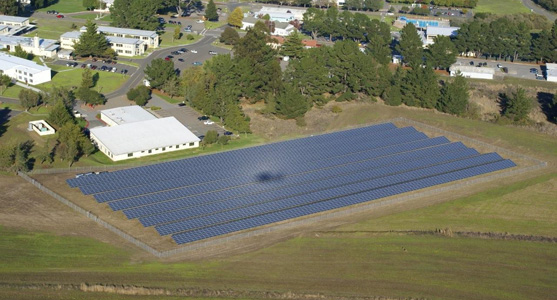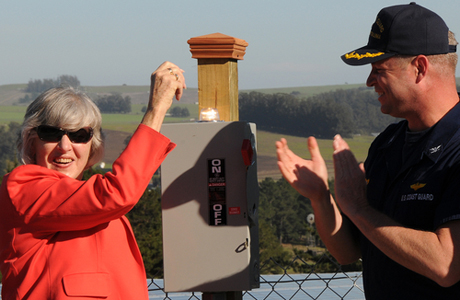Nestled among the rolling green hills of the Petaluma countryside, Coast Guard Training Center Petaluma (TRACEN) serves as the training hub for many of the Coast Guard’s jobs and specialty schools.

The new four-acre solar array field will produce approximately one megawatt of clean renewable energy each year for the Coast Guard Training Center in Petaluma. Photo courtesy of U.S. Coast Guard
That shared commitment will now extend to include a greener, environmentally conscious Coast Guard base. In October, Congresswoman Lynn Woolsey joined Hall and other Coast Guard personnel, including training center students, to dedicating a four-acre array of solar panels recently completed at the Training Center.
Earlier this year, the Coast Guard awarded the first power purchase agreement (PPA) in its history to SilRay of Palo Alto. The PPA is an agreement between the Coast Guard and the contractor, SilRay, in which the contractor will pay for the expense of building, operating and maintaining a solar photovoltaic system on Coast Guard property. In exchange, the contractor is awarded tax credits and discounts, making the construction more affordable. The Coast Guard benefits from the installation of the renewable energy resource facility with no up-front costs, and is able to purchase the energy produced by the system at a contracted rate for the next 25 years.
“This project cost the Coast Guard $6 million to complete,” said Tony vanWinden, Energy Manager at TRACEN Petaluma, “but by awarding the PPA the Coast Guard pays none of the up-front cost and the contractor receives tax credits and incentives which make the construction more affordable. It’s a win-win situation,” he said.
The agreement helps the Coast Guard save money, have less of an impact on the environment and decrease the demand for energy on the local community power grid, said vanWinden. This will be especially noticeable in the summer months during peak demand when energy consumption is at its highest. At that time, the energy production of the on-base solar array will also be at its peak.
The PPA also helps the Coast Guard meet the standards set forth by the Energy Policy Act of 2005 by increasing its use of renewable energy. The agreement is in line with several provisions built into the Act, including establishing a photovoltaic energy commercialization program in federal buildings and producing renewable energy on site or on federally owned land, said vanWinden.
“The agreement benefits the Coast Guard, it benefits our neighbors, it benefits California and, with rising energy costs, it’s a step in the right direction,” said Commander Jeff Good, TRACEN Petaluma’s Facilities Engineering Officer.
The PPA also falls in line with the Petaluma green initiative, a multiple branch program designed to make the Coast Guard base more environmentally compatible through a combined effort to decrease energy consumption and improve water conservation. “One of the things we need to be as coast guardsmen is good model citizens. Projects like this, working with the community, help us fulfill some of that creed,” said Sullivan.
“You just have to know how proud we all are that this community was the first to start something of this caliber,” said Congresswoman Woosley.
Woosley said that the Coast Guard is a valued member of the community and that they should be proud of their achievement today. She then added that she values the Coast Guard not only because of their military service, but because they are such amazing members of the community.
The PPA comes on the heels of TRACEN Petaluma’s other successful solar panel installations, on the roofs of two of the training center’s buildings.
When combined with TRACEN’s existing 125-kilowatt solar panel array, the scheduled four-acre array is expected to provide TRACEN with up to one megawatt of renewable power, which will meet a majority of TRACEN’s daily electrical demand and up to 60 percent of its peak demand needs, said vanWinden.
“We want to be a good neighbor and a good steward,” said Hall. “This is an area that is incredibly environmentally sensitive. It’s important to our neighbors, it’s important to our congresswoman, and to be a good steward in the Coast Guard is important to us.”

Congresswoman Lynn Woolsey helps Capt. Christopher Hall flip a power switch to signify the opening of the newly constructed solar array field. U.S. Coast Guard photo by Petty Officer 3rd Class Erik Swanson.

